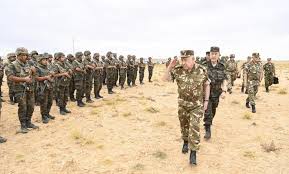
Algeria’s army has announced the elimination of six armed terrorists in the eastern region of Tébessa, in an operation aimed at demonstrating the state’s ongoing commitment to combating persistent security threats.
According to a statement from the Ministry of National Defense, the anti-terrorist operation took place on the night of September 23 in the mountainous area of Tlidjène. The intervention resulted in the neutralization of six individuals and the seizure of an arsenal of assault rifles and ammunition.
The army described the operation as a “major success,” presenting it as evidence of its determination to eradicate terrorism in the country.
Chief of Staff Saïd Chanegriha was present on the scene, and President Abdelmadjid Tebboune sent his congratulations to the troops, reflecting the government’s desire to emphasise the symbolic and strategic significance of the operation.
However, analysts note that more than twenty years after the official end of Algeria’s “black decade,” similar announcements continue to raise questions about the actual scale of the threat. Observers suggest that these communications may serve as much to reinforce internal political legitimacy as to address genuine security concerns. The government’s highlighting of ANP operations occurs against a backdrop of diplomatic tensions, social unrest, and ongoing challenges in projecting an image of stability.
Authorities continue to frame terrorism as a “definitive eradication” mission. Yet the presence of volatile borders with Libya, Mali, and Niger underlines the structural and regional nature of the threat. The Tébessa operation thus serves a dual purpose: demonstrating the army’s vigilance in confronting insurgent groups while reinforcing state authority through a security narrative that also addresses internal and international perceptions.
For Algeria, such operations underscore the complex interplay between military action, political strategy, and regional security, illustrating that the fight against terrorism remains both a domestic and transnational challenge.



